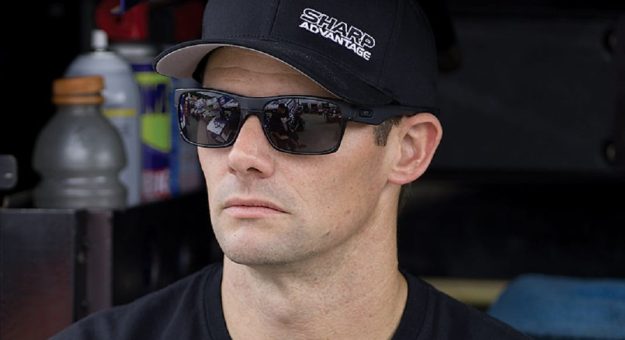DP: I don‘t know. I think, from the outside looking in, I hear that comment a lot. And, truthfully, I almost look at it the opposite way, unfortunately. We‘ve been really blessed that we‘ve been able to do this as a family, and this is the way that we chose to go up and down the road, is with my wife and my kids at almost every race. There‘s very few that they have missed.
So, I think the scary part is, a lot of people think I‘m going to be home and see my family more but, essentially, I feel like I‘m almost taking a step where we‘re going to be married to a business. And, even though we may not be travelling, I actually foresee that I could see them a lot less than what we do now. I mean, we spend an unbelievable amount of time together now, which is awesome. And the only way that we would do this type of life — I don‘t leave for weeks on end like some drivers, that their kids are at home or their wife works, so my family travels with me.
We‘re together probably more than most. So, absolutely, putting them in fulltime school is something that we‘re looking into; that is a small factor in some of this, but definitely not the deciding one.
So I think, obviously, my faith is just something that‘s been with me my whole life, and that‘s all in my upbringing and Mandy‘s as well, and the upbringing we have with our kids. So, as far as the business side of it goes, it‘s always something I‘ve been interested in, and sprint car racing is…it‘s been our life. It‘s what we‘ve devoted our entire life to.
It‘s what I understand; it‘s what I know. And I feel like I know it from several aspects, not just driving. You know, I‘ve never promoted, but I‘ve been involved, and I feel like I could do that because of as long as I‘ve done it and from the business and manufacturing and the product side of it, and dealing with business owners and sponsors with our team.

Staying involved in racing, to me, is very important. I don‘t feel that I need to walk away and need to stay away, or I‘m going to have the itch to drive. I feel very confident that I can stay extremely involved in the sport without driving, or possibly just driving very short term. I don‘t feel that I‘m leaving premature and I feel like I‘ve got something left to prove. I feel like I can walk away and not have any what ifs.
And I think that‘s what makes it more difficult for people that maybe just need to…when you do see them leave, they just disappear. And I think because it‘s hard for them to be a fan, or follow it or be involved without thinking that they should still be out there competing.
So, my thought process could change after I‘m out of the seat for a little while. I definitely know that, and I‘m open to that. I definitely don‘t want to be the guy that says I retired and six months later I‘m right back racing. I just know that we are very strongly looking at doing something else fulltime and where that leaves my driving career is kind of yet to be determined.
SC&M: OK, let‘s back up and go through your career. You started out in the quarter-midgets and the micro-sprints and obviously in Oklahoma several other drivers have also come up through that route — like Shane Stewart, Brady Bacon, Christopher Bell — and it‘s clearly a great launching point for successful careers in sprint car racing.
DP: Yeah, honestly, I really owe a lot of the success that I‘ve had in this sport, and the opportunities that I‘ve had really started with, just where I grew up and where I‘m from. That‘s been a huge part of it.
And, to be able to grow up and have such a healthy quarter-midget track right there in town and then also to have a very thriving micro track right there in town as well — still one of the most popular in the country — and then ASCS being right from Tulsa.
To say there‘s more talent from Tulsa than from maybe some other places isn‘t necessarily true. We just had more opportunities. Because there were opportunities for us to race and to progress through different ranks rather than, you know, you go to so many places that might have a great quarter-midget program and then there‘s nowhere else for the kids to move up to and that kind of ends their career and they do something else.
So, absolutely, quarter-midgets are a great place to start, learning fundamentals of racing, driving but, more importantly, it‘s just a great family activity for families to be able to do, and travel, and meet people. You know, I love what I do and I love the racing but, truthfully — from the beginning, from quarter-midgets till now — the best part of it is the people. I still have friends from quarter-midgets that I talk to weekly, or monthly, or several times a year, and those are relationships that just last forever.
That‘s no different throughout the ranks, and it‘s a bond that…you know, to share a love of racing with other people is…I think that‘s what‘s made this whole career and this whole lifestyle, to me. What makes me feel so blessed is that it‘s not just a job.
I‘m around people and we share a common love for something and you meet some amazing people along the way.
This question-and-answer session will be continued in Q&A: Daryn Pittman & Stepping Back, Part II.![]()
